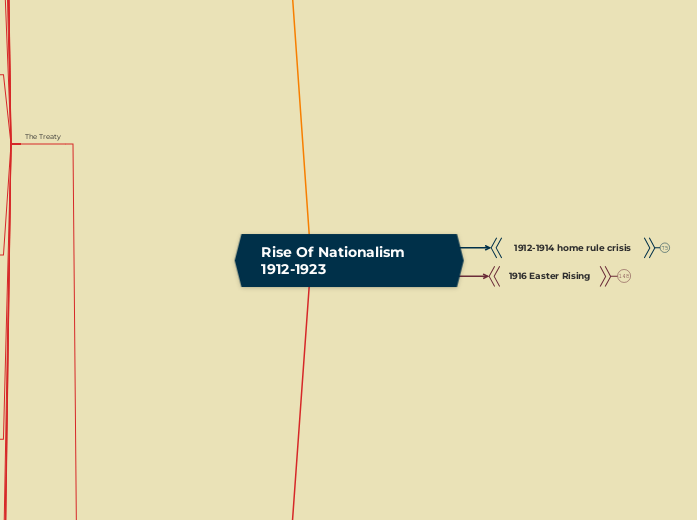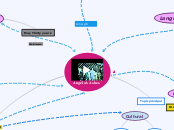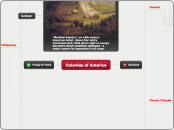Rise Of Nationalism 1912-1923
Civil War 1922-23
Results of the Civil War
Strengthen political Tradition
Sinn Fein was split and new Political parties emerged
Fianna Fail
Fine Gael
Great bitterness between opposing sides lasted for decades
The economy was in a bad way
We Lost some of Irelands most ablest Leaders
Michael Collins, Arthur Griffith, Rory O'Connor, Erskine Childers and Cathal Brugha
Damage to Infrastructure
4000 people killed during the 10 months of the Civil War
Civil War
Events
24/5/1923
Civil War ends
New Leader Frank Aiken and De Valera called for a Ceasfire
Liam Lynch, leader of Irregulars is killed in Tippary Mountains in April
Decided to use Irregular prisoner to clear road blocks
The Kerry/March Attrocities
12th
5 irregular prisoners were shot in the legs and strapped to a mine each then blown up near Cahersiveen.
7th
4 more prisoners blown up in Killarney
6th
8 Irregular Prisoners blown up by landmine in Ballyseedy
5th
5 free state soldiers killed by a booby trap bomb in north Kerry
Sean Hayes, TD, shot by Irregulars, retaliation shootings carried out
Kevin O'Higgins order execution of Rory O'Connor his best man
Possessions of guns could get you executed
Internment
Collins gave Erskine Childers a gun/ still shot
77 killed
Public safety Bill
Military Courts/Councils
O'Higgins becomes minister for Justice
WT Cosgrave becomes head of free state
Collins killed in Beal na Blath
Signals the start of the atrocities
Funeral attended by both sides
Coffin shipped out to Dublin
Both sides respected him
Reaction of unbelievable proportions
Arthur Griffith is Killed of a brain haemorrhage
Collins solutions
Ships troops into Limerick Waterford Cork and Kerry by Boat
Munster Republic
All anti treaty forces use guerilla tactics south of a line from Limerick to Watford
Collins become Commander-in chief
Free state increase soldiers to 60,000
Breaks out in Dublin
Regulars take control Of Dublin
Cathal Brugha killed
Thought his dead might stop fighting
Anti Treaty forces were driven out
Build up
Free State fire on 4 Courts with British 60-pounder artillary Guns and after 32 days they surrender Civil War begins
British tells Collins that if they dont solve it, they will bring troops
Sir Henry Wilson murderd in Northern Ireland
De Valera breaks peace treaty
The Vote
Other 14
Unionist 4
Labour 17
Anti Treaty 35
Pro treaty 58
People of Ireland vote for the Treaty
Rorry O'conor and irregulars take over the 4 courts
Tries to make Peace Treaty with irregulars
Collins does not attack
Irregulars raid Clonmel barraks
Large supply of guns and ammunition taken
De Valera takes other barracks for Republicans
Irregulars
Collins takes some British barracks to build up Free state Army
Led by General Mulcahy
Regulars
British Troops start to leave
The Treaty
Dail puts it to the peoples vote
Anti Treaty
Dan Breen, Tom Barry Cathal Brugha, Austin Stack
Pro Treaty
Kevin O'Higgins
WT Cosgrave
Richard Mulcahy
They Vote
Arthur Griffith Becomes new president
De Valera resigns and walks out
7 votes decide it
64 vote for
57 vote against
Reaction
Against
Many didn't agree with the partition
Didnt have full independance
For
Stepping stone
Refusal would end in war
Bitterly divided over the terms
The Dail debates the treaty
De Valera is furious
Govener General
Any decision/new law can be overruled by him
Cobh (Spike Island), Berehaven (West Cork) and Lough Swily (Donegal) kept by England
Same Status as Canada
All TD'S swear OATH OF ALLEGIANCE to King
Partition of Ireland kept
Decides the boundary of Ireland and the north
Boundary Commission
The Talks
The Threat
Collins signed
Lloyd George threatened an invasion if they didn't sign
Letters
Several proposals
First Proposal
There was no agreement here
De Valera sought an Irish Republic
Lloyd made it clear that the King would be Head of State and Ireland would bee partitioned
British Delegation
Birkenhead
Chamberlin
Churchill
Lyod George
Irish Delegation
Brugha, De Valera and Stack refused to go
Plenipotentiaries
Duggan
Duffy
Childers
Barton
Collins
Griffith
British Reason
King George V called for peace
Bad Publicity in British and World press
Financial and political cost OF sending troops
Irish Reason
Ireland was in an economic collapse
IRA was running out of bullets
Martial Law Spreading
Britain was gaining upper hand
Took 5 months of negotioations
Truce Called on 11/7/1921
1919-1921 War Of Independence
Foundation of Northern Ireland
Riots
All Catholics kicked out of jobs
More catholic deaths
Local Councils
Catholics with very little (2/6)
Majority of seats were Protestant (4/6)
More Protestant Jobs
Gerrymandering
Catholics are discriminated
Less in Catholic areas
More canidates in Protestant ares
Special Powers Act
IRA owtlawed
Susspected IRA members of were Imprisoned without trial
New Forces
B-Specials
Treated Catholics harshly
Reserves
part time police force
RUC
Royal Ulster Constabulary
Mostly protestants
Terms
Ulster agreed, Sinn Fein did not
England in charge of defense, budget and foreign affairs
They're in charge of dometic things
FAT DAD
Down
Armagh
Derry
Tyrone
Antrim
Fermanagh
War of Independence
Anglo Irish Treaty
All TD'S swear Oath Of Allegiance to King
Control all trade and foreign policy
Own Army, Flag, Stamp, Passport and currency
Still part of British Empire and King still Head of State
Not a republic
26 counties: Irish Free State
Truce
Truce called in 1921, 11 of July
Talks in England with Eammon De Valera/Sinn Fein
King talks to Lyod George
IRA losing bullets and guns
British people embarrassed of the atrocities
Attacks on The Customs House
De Verla and Michael have a Argument
80-100 men captured or killed
Surrounded
They burn it
100 IRA men attacked the Custom House
25 MAY 1921
Cross Barry Ambush
Ends with 10-40 British casualties and the IRA escaping with 3-6
1300 British soldiers trap IRA memebrs
19 march
Government of Ireland Act 1920
1 parliament in Dublin, one in Belfast
North and South
Partions Ireland
Burning Cork City
Bayoneted hoses to stop firemen doing their Job
Black and tans were supposedly Drunk
Embarrassed the British Government
Black and Tans burn Cork City Centre to the Ground
1 man killed in Cork city during ambush
Kilmichael Ambush
According to Tom, he called a ceasefire, and 2 people were shot dead by British
Tom Barry leads 36 Volunteers and Kills 18 Auxiliary's
Auxiliary's being really annoying
Bloody Sunday
Event Shocked even the King Of England
30 People were killed at the end of one day
Mutilated 2 Irish men in Dublin Castle
Killed 14 men
Mike Hogan
Black and Tans head to Croke Park
The Squad killed 12 members of a Brittish Group called Cairo Gang
Kevin Barry
He is hanged
Women's at walls begging for release
The Pope and USA try to get Reprive
Sentenced to Death
Was arrested for being near the scene of 3 brittish murders
18 year old Medical Student
Brittish Response
Reprisals
Terenece McSwiney takes over
Became a world wide figure
Dies on Hiunger Strike in English Jail
Thomas MacCurtain, Mayor of Cork was murdered by RIC
Houses and Creameries burned
Prisoners executed
Black and Tans became harassers to the local population
New soldiers
Auxiliary soldiers are a worse branch of the Black and Tans 1920
Auxiliary made up of former military Officers
Mainly former soldiers
They were given 10 shillings a day
13,000 came
Called Black and Tans due to Tan Pants and Black Jakets
Winston Churchill hired Black And Tans 1919
Some Irish Ric Members decide to leave
IRA decided to attack
Guerilla warfare
Had no Uniform
Led by Local Men who knew lay of land and ho could hide
Flying columns
no longer believed in blood sacrafice
would not fight in open
Using ambushes and dissapear
Raids for amunition and guns
They would attack and then disappear in crowd/countryside
hit and runs on RIC Barracks
RIC ambushed on same day by Dan Breen as the dail was founded
They disappeared in the crowd
Eammon De Valera raises 4 million in America
IRA (Irish Republican Army) used to defend The new Dail
Role of Michael Collins
Introduced guerilla warfare
Minister of finance
Raised money for government
payed flying columns
Organized the squad
First Dail
Positions
Cathal Bruagh/Minister of Defence
Countess Macreviz/Minister of Labour
Authur Griffith/ Minsister for Home Affairs
Michael Collins/ Minister for Finance
De Valera/ President of the Dail
Many county Councils supported them
British declare it illegal
World of nations hear about this due to message sent by them
Declares independance
Volunteers used as police
Sinn fein courts
29 TDs
35 in total didnt show
21st january 1919
They set up an illegal government in Dublin
They used abstentionism
Sinn Fein: 73 seats/Home rule:6/Unioists:26
German plot
This won them sympathy
Tom ashe died after being force fed while on hunger strike
Politicians arrested by British for dealing with germany
The main threat was conscription, but Sinn Fein led a strong anti-conscription campaign
By elections
All young
Home rule lost all 4
Sinn Fein win all 4
there were 4 by-elections between 1916-18
Support of catholic church
Eammon De Valera becomes President of Volunteers and Sinn Fein
Michael Collins and Eammon de Valera becomes important leaders
he now wanted an Independent Irish republic
Minor political party until 1916
Sinn Fein blamed for rising
1916 Easter Rising
Results
Recruitment of Irishmen to British army fails
90 people sentenced to death
De Valera was not executed as he is an American citizen
14 people executed by firing squad in Kilmainham
3400 people arrested (many innocent)
Countess Markievicz sentenced to life
1800 people sent to Frognoch wales
Executions cause the public to want a free Ireland
Peoples opinion swings to vavour a rising
Anger of a food shortage
Martial law and curfew still imposed
Known pacifist killed by British
Home Rule In Danger
3.8 million worth of damage
Rise of Sinn Fein
Between 1916-18, more and more Sinn Fein candidates emerge
1918 Sinn Fein won general election
Sinn Fein destroyed Home rule party
Some soldiers released (Michael Collins, Eammon De Valera) join Sinn Fein
Griffith wanted home rule but changed his mind after rising
2,500 injured
500 people killed
300 civilians
157 soldiers
64 volunteers
The Rising
Outside Dublin
Thomas ash attacks Ric station in meath
Liam Mellow leads 600 volunteers against RIC stations
Saturday 29th April
at 12:45pm
All Leaders taken to Killmaonhaom Jail
Nurse O'Farrell walked down O'Connell street with white flag
They agree to an unconditional surrender
Pearce witnesses innocent people getting killed
Friday 28th April
O'Rahilly killed blocking an escape
Padraig Pearce makes inspiring speeech
GPO in Flames
Thursday 27th April
South Dublin Union was pinned down
James Connoly wounded in ankle on Thursday
Wednesday 26th April
Mendicity Centre taken on Wednesday
General John Maxwell was appointed Commander of British forces in Ireland
Gun Boat Helga shells Liberty hall and GPO
Battle Of Mount Street
Best result of the war
17 rebels killed 220 soldiers
Tuesday 25th April
Looters take to street, some are shot
City Hall retaken
British put snipers on Trinity College to fight rebels in royal college of surgeons
They declared an Irish republic on a worldwide transmission
On Tuesday 2,000 soldiers arrived in Dublin
General Lowe
Monday April 24th
Rebels attracted Little support from the citizens of Dublin
Martial Law and Curfew introduced
Cordin around Dublin
Didn't Take Train stations, and trinity college and Dublin Castle
Moved to various locations around the city (Four Courts, South Dublin Union, Jacobs Factory and The Royal College of Surgeons)
They then took GPO
Rebels killed Lancers trying to take GPO
Pearce read about the Proclamation outside GPO
The First Outpost was City Hall
Planning the Rising
Thomas McDonough wrote that the rising would go ahead with 1250 men
The British did know but decided to go to the races
Padraig Pearce decided to do it anyway
When Aud is captured, McNeil Pulls out
puts advertisements about their orders being rescinded
Roger Casement
Hanged at Pentonville prison
Captured and taken to England
Caesmant arrives on Banna Beach
Weapons scuttled in cork Harbor
The ship, the Aud, arrived in Kerry
Casement goes into submarine
Tried to bring 20,000 rifles from Germany
wants to help Ireland get freedom
British Diplomat
McNeil finds about the forgery
KEEPS HIS SUPPORT
Every week Irish soldiers would march around the city
The Castle Document
MC NEIL FIGHTS
the Military Council forged a document Called the Castle Document which said that Britian were planning to disband the IVF.
Eoin Mac Neil would fight if
if the british went back on their promise about home rule
If Conscription occurred in Ireland
the British arrest the leaders of the IVF
O'Donovan-Rossa's burial
Padraig Pearce speech
the fools, the fools, the fools
Publicity
IRB wanted full independence
ICA joins with the IVF and creates the Irish Republican Brotherhood (IRB)
The Military Council
Joseph Mary Plunkett
Married Grace Clifford on eve of execution
29
Thomas McDonough
In Jacobs Factory
38
Sean Mac Diarmada
Revived rising
32
Thomas Clarke
Explosives Expert
59
Eammon Ceannt
In South Dublin Union
Founder of IVF
35
James Connoly
Founder of ICA
47
Padraig Pearce
In GPO
Believed in Blood Sacrifice
thought their deaths would inspire Ireland
37
In 1913 one third of Dublin's population lived in Slums
lack of occupational opportunities for unskilled workers
30,000 families in 15,000 settlements
Infant mortality rate was very high for a European nation
An estimated four million pledges were taken in pawnbrokers every year
High Rate of disease
tuberculosis
The Lockout
Murphy won in the End
James Connolly formed the ICA in 1913
Protected workers from IRC
William Murphy opposes Larkin
employed blackleg workers
"Anyone on your staff that is in that union was locket out"
employers didn't like that he wanted to hire more people
20000 workers preformed a strike from August 1913 to 18 January 1914
Tram driver stop working
Leader was Jim Larkin
The Irish Transport and General Workers Union(ITGWU)
Major strike in Dublin in 1913 involving the first Trade Union
1912-1914 home rule crisis
WW1 Outbreak
IRB Decides on Armed Uprising
Home rule bill postponed
Nationalist split
Eoin McNeill opposed to Irishmen fighting abroad
10,000 men stayed
John Redmond supports Irish men fighting abroad
110,000 men join up
Curragh Mutiny 1914
Many officers say no
British soldiers asked to march against members of UVF
Nationalist Reaction
Howth Gun running
Ship called Asgard brought by Erskine Childers
25,000 rounds of ammunition's
900 rifles
Irish Volunteer Force (IVF) founded
120,000 members
McNeil writes book called The North Began
Unionist Opposition to Home Rule
Huge demonstrations eg 500,000
Larne gun running
5,000,000 rounds of ammunition's
35,000 guns
Support from Conservative party
Ulster Volunteer force (UVF) founded 1913-10,000 members
Signed Ulster Solemn League and Covenant signed by a 1/4 million men on September 28 1912
3rd Home rule bill
This meant that they could only delay the home rule bill, meanning that it would happen in 1914
1911 Parliament Act
House of lords allowed to delay acts for 2 years but not veto
Conservatives wanted to "kill home rule with kindness"
Opposed by Conservative leader Andrew
Nationalists supported the desicion
proposed by Liberal Leader Herbert Asquith in 1912
David Lord George
if not he would replace them
House of Lords threatened by King to allow rule to pass
Proposed a bill to tax rich people more
Cultural Revival
Anglo-Irish literary movement
Gaelic leauge
Gaelic Athletics association
Background
Previous tries
2nd Home rule Bill is 1893
Defeated in House of Lords
Passed in House of Commons
First Home Rule Bill is 1886 by Charles. Stewart Parnell and PM Gladstone and the Liberal party
Defeated in House of Commons
Nationalism
mainly Catholic
Irish Republican Brotherhood
Would use Physical force to get a republic
Complete independence
Small secret group
John Redmond
Didn't want complete split with Britain, but rather home rule
Leader of Home rule Party
Sinn Fein
Then decided that they would absente from parliament if they make it
First wanted Home rule
Small Party
Founded by Arthur Griffith
Unionism
mainly Protestant
mainly north-east Ireland
Conseratives
sought steady change through sharing power and wealth
Leader John Redmond
governed in the interests of the rich and Liberal
Leaders
Edward Carson and James Craig
Carson was elected MP for trinity college









